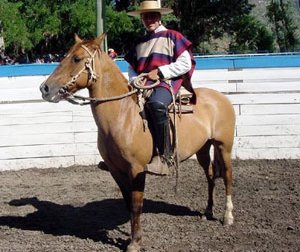
A pure Chilean breed appeared by the beginning of the 19th century, and the Chilean Corralero appeared by the end of the century.
Historical View As in many places of the world, in Chile the horse is a work animal. First it was used by Spanish conquerors for war and for agriculture. When Chile got its independence, the horse was a indispensable partner and used daily; in war for the Army, in the plantations for the countryman and for transportation for everybody.
The Chilean Corralero has its major ties in use for working cattle and is now used heavily in Chilean rodeo, which had its origins in the countryside as a game of chasing cattle. It is in this modern event that the Chilean Corralero shows all of its abilities.
Physical Description The Chilean Corralero has a very distinguished appearance. It is a horse with very good proportions for the work that it is destined to do.
The characteristics of the Chilean Corralero are a proportional flat head, small and separated ears, eyes and nasal apertures must go behind the facial profile, a fine and small muzzle, manes must be abundant and undulated in tuft of hair and tail, broad and deep chest, a voluminous center and arched ribs, full and short flanks, rounded hindquarters, a hard musculature, short extremities and 1.40 to 1.43 meters height.
All these characteristics make it possible for a horse of 370 kilograms to stop and press a 500 kilograms bull.